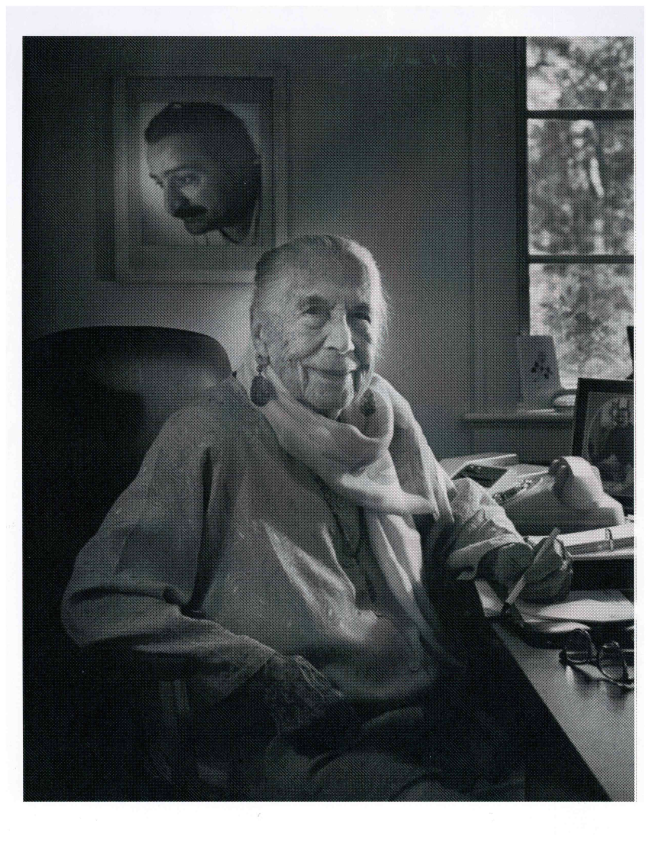
August 25, 2023
The Shifting of Consciousness
Kitty Davy simply saw her life divided into three parts: the time before she met Baba, the time after she met Baba and lived with Him in India, and the time she lived apart from Baba in America.
When Kitty began writing her talks to be given at Meher Center and other places, her initial intent of course was to talk about her times with Baba in the body, but something else unfolded. Not surprising for a seeker of her caliber, her talks became a means for the expression of her inner life. In them, she became an aspirant examining the work of God in the “now.” Explaining the culmination of her long association with Baba, she writes, “Looking back, however, I realize that above all other aspects of our early lives with Baba in India and in the West, there was one fine thread that went onto the canvas, and that fine thread, as I see it today, concerned consciousness.” [1]
In all her humility, Kitty admitted that during her physical contact with Baba, she was completely ignorant of the word ‘consciousness.’ “Can you imagine anyone reading the Discourses or God Speaks and the eye not registering the word, ‘consciousness’?” It brings home the point that things can pass us by until we are ready to really see them. [2]
For Kitty, like the other mandali, the focus was on being in Baba’s company and following His orders. How Baba worked on them was not their concern. It was only later in her life that she started to reflect and understand what Baba was doing with them. She recounts Baba asking His mandali in the middle of the most mundane activity about their thoughts. “What are you thinking?” He would ask suddenly. We have all heard profound and humorous stories that came from this very question posed to so many of His lovers during His lifetime. But nothing He did was without reason, however trivial it may have appeared. “He was working to bring our consciousness away from self, away from the many objects of illusion and duality, with its wants and desires, to the one object of Himself, or God,”[3] says Kitty. Thinking of Him and shifting our consciousness is a gradual process that can take lifetimes. Kitty elaborates further, “I recalled Baba’s words that those who concentrate their lives on Him gradually become identified with Him in consciousness. Little by little, their humanity is absorbed into His divinity and they become free.” [4]
In the year 1937, many Westerners, including Kitty, lived with Baba. Those days were not easy due to the clash of ego-minds and the lack of harmony. As a solution, Baba decided to give them “an alternative ego to work with—an ego centered on, and devoted to, Himself. He called it a provisional ego.” [5]
Kitty sees the use of this provisional ego as a constant tool in shifting the consciousness. “It worked this way: before beginning whatever work Baba gave us to do, we were to say, ‘Baba is doing this or that through me. He is the doer, the speaker, the thinker.’” By doing this, Kitty felt an immediate increase of love for Him. [6]
Here, Kitty brings us to the crux of the matter: love. Meher Baba’s path is that of love, all He asks of His lovers is to love Him. Many on the path are baffled by the seemingly simplistic technique.
Baba says that love is a gift from Master to man. How, then, does one love Him? The mandali spoke profusely about remembrance—Thinking of Him, remembering Him, making Him our constant companion. Hand in hand with love goes pleasing the Master. In his talks about Baba, Adi K. Irani (one of Baba’s mandali and a contemporary of Kitty) stresses the importance of pleasing Him. “Pleasing Him is the greatest thing of our lives … even greater than obeying Him, and I would say even than loving Him, because to please Him means to dance to the tune of His wish all the time.” [7]
Through her contemplation of consciousness, Kitty shows us how we can decipher what would please Him. These three ways are laid out by Baba: to think of things we would not hesitate to think in His presence, speak words we would not hesitate to speak in His presence and to do actions that we would not hesitate to do in His presence. To this list, Kitty adds one more statement that Baba gave: “Think of Me, remain cheerful in all your trials, and I am with you, helping you.” [8]
Within this seemingly simple task, isn’t there a hidden jewel of the strictest inner discipline not isolated to the time and length of practice but to be performed all the time? Kitty says, “…these points could not be acted on 100 percent, and obeyed, unless there were first the consciousness of Baba’s presence throughout, with Baba as the object of consciousness.” [9]
[1] One Fine Thread, by Kitty Davy, p. xiv
[2] One Fine Thread, by Kitty Davy, p. 206
[3]One Fine Thread, by Kitty Davy, p. 207
[4] Ibid.
[5] One Fine Thread, by Kitty Davy, p. 113
[6] One Fine Thread, by Kitty Davy, p. 114
[7] Just To Love Him, by Adi K. Irani, p. 92
[8] One Fine Thread, By Kitty Davy, p. 117
[9] Ibid.